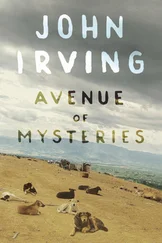Only at half-past seven the next morning, as he walked through the ice-cold administration wing, did he think of her again, and instead of making coffee he first checked his private e-mail account. She had sent him two messages. The first was a full-length paragraph about how “inspiring” their conversation was, about her participation in the D66 youth council and how his name was mentioned there often. This alarmed him. In the old days, before he was married, he had had difficulty recognizing flirtatious females; in the meantime he’d got good at it, but these days he couldn’t tell genuine interest, erotic or not, from what one now benignly called “networking.”
The second message was short and to the point. “So do you like red wine?”
He was at a complete loss. For twenty-five years he’d reacted to female advances in the same way, namely by not reacting, and yet he noticed that all weekend his thoughts were funneled toward this girl. At night, lying next to the unconscious Tineke, he imagined them sitting across from each other at that cafe of hers; stretched out on his back he tried to recall certain parts of her body. On Monday morning in his office, in an unguarded moment, he typed: “Isabelle, I’m dying for a good glass of wine.”
Their e-mail correspondence snowballed, eventually it hit thirty in a single day. That ever-flattering attention: she buried him in cheerful, energetic, infinitely interested paragraphs and sentences, questions about his work, about his daughters, his opinion about this and that, about films and books he knew, or maybe didn’t know, about his past, about his youth — for days on end, until he couldn’t stand it any longer and started to tweak the tone of their exchange. Yes: he was the one who started openly lusting. Loosening up the attitude. After a fortnight, even periods and commas carried a double entendre. If she mentioned having gone swimming he asked her to describe her bathing suit; when she described her bathing suit, he asked what kind of underwear she had on, right now for instance.
“None,” she replied.
“None?!”
“My God, Siem, of course I’m wearing underwear.”
“Isabelle, what kind of underwear?”
“What kind of underwear would you like me to be wearing?”
He was surprised by his own randiness. He was not the sort of man to slack off at work while chasing erotic thrills, let alone allow a nineteen-year-old teenybopper to undermine his stable, entirely becalmed private life. Not that he never took any risks in life — he felt that he was constantly taking risks, but these were dangers that presented themselves to him in broad daylight and were far removed from adulterous urges. He was a man without erotic secrets. Maybe even without erotic desires.
Nevertheless he spent those first few weeks scouring the campus in the anxious hope of catching a glimpse of Isabelle Orthel. He pored over her sorority yearbook (on his office bookshelf: he had penned the preface) and found two photos — God, that’s her all right. And still he was gobsmacked when, at the official opening of a new hockey canteen, he saw her standing right up in front. Was she that beautiful? Her pale face seemed illuminated, like a landmark town house. He’d forgotten how nonchalantly she put her straight, black hair up. Forgotten how she stuck her thumbs into the waistband of her jeans when she listened to someone, and how attentively her glistening mouth pursed, eager to reply.
Fortunately she waited an hour before approaching him, apparently the time she herself needed to summon her courage. It was absurdly wonderful. Only later did he worry about how it looked, the hotshot and the hockey babe: broad gestures, nonchalant touches to the shoulders and forearms, whispering in each other’s ears, unrestrained bursts of laughter — at one point she even gave him a little rap on the cheek, “Rascal!” she laughed at something, he had forgotten what.
Among his injudicious resolutions for 1999 was a date in a bistro in Almelo, the nearest place he dared to meet her in public. He hadn’t laid a hand on anyone other than Tineke since 1974, and all evening he felt like he was in heaven. They talked about his bleak youth in Delft, about her scintillating plans for the future, the difference between jazz and classical (she had once toyed with the idea of studying voice at a music conservatory), about neckties and the benefits of being a girl, about her curious aversion to Thailand, about fidelity and infidelity, and he realized: I am in love. On their way back to the station in the dark (he traveled first class as a precaution—“chicken,” she called him) she shoved him into an alleyway and started to kiss him. He rested his ice-cold hands on her shoulders, and was aware of her own hands as they explored his body under his clothes, ended at his buttocks and, after a few minutes, undid his trousers. She removed her deerskin gloves, but he pushed her fingers away. With a “quit fussing” gesture that took him rather by surprise, she released his penis and pulled at it. He was a head taller than she, so that he could avoid her coppery foxlook. He felt discreetly uncomfortable.
The train journey through the evening landscape made him tender and reflective. From his otherwise empty first-class compartment, his startled, half-erect member pressing against his inner thigh, he stared out at a nearly full moon, knowing that somewhere else in the same train an unruffled, gentle, improbably attractive girl was staring at that same scoop of ice cream, thinking of him . He was amazed by her audacity, by her vivacity, her strength. No trace of the kowtowing he was accustomed to, because he was thirty-five years older, because he was the boss of the university where she still had to pass her qualifying exams. Isabelle Orthel was brimming with confidence. He involuntarily compared her to Margriet Wijn, the only other nineteen-year-old girl who had ever shoved him into an alley. The differences were so great that he suspected he was in love with the contrast itself.
He had spent enough time at the Star Busman home to know that any member of the exemplary family where, by a twist of fate, Isabelle had found refuge, had standards to live up to. Her adopted grandfather sat on the Supreme Court and in his free time wrote biographies of the Dutch maritime heroes Maarten and Cornelis Tromp. He was a man who fathered professors rather than children. Like her mother, the impressive clutch of aunts and uncles Isabelle mentioned were Ph.D.s in one thing or another — collectively, it seemed, serious people with serious positions at universities, law courts, or human rights organizations; if not, they painted or sculpted something that merited exhibiting. The old oak tree had branched out sufficiently over two generations to provide Isabelle with a cousin or two in pretty much every college fraternity in the country — the Star Busman clan was, to put it bluntly, a potent entity that convened at least twice a year in Isabelle’s grandparents’ villa in The Hague to report on its advancement in society. Isabelle rose to the occasion. Like her adopted family, this privileged girl, who waltzed through her exams, who earned her pocket money as a singing waitress in a piano bar, who organized a student trip to Prague (including a visit to Theresienstadt), who had the choice of three women’s debating societies, knew exactly what she wanted out of life.
And Margriet? What did Margriet think about when she was nineteen? Not about booze yet, at least not the whole goddamn day anyway. What went on in that foggy head of hers was a mystery to him; in any case, it had nothing whatsoever to do with the future. Bugaboos, worries, complexes — his first wife had been stuck in an emotional morass that would have swallowed up anyone in postwar Holland, no matter what their background: rich or poor, clever or stupid, privileged or not.
Читать дальше












